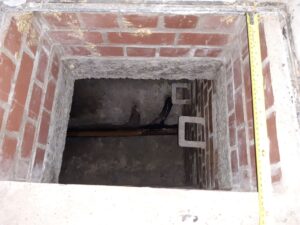Kettering General Hospital NHS Foundation Trust has been fined £480,000 after an employee suffered a brain injury after he was found unconscious in a manhole.
The man had been unblocking a drain at the hospital on 1 February 2022 when he was discovered by other members of staff.
He was rescued from the manhole by Northamptonshire Fire and Rescue Service and was treated at hospital for acute sulphate intoxication. This resulted in a traumatic brain injury, and ongoing issues with memory loss and nerve damage.
HSE guidance can be found at: Introduction to working in confined spaces (hse.gov.uk)

A Health and Safety Executive (HSE) investigation found that Kettering General Hospital NHS Foundation Trust failed to identify the manhole as a confined space, and thereafter, failed to properly risk assess the activity. The trust failed to prevent entry of employees into confined spaces at the site – which was custom and practice for a number of years. The trust also failed to identify a safe system of work or method statement for clearing blocked drains and no precautions were identified to reduce the risk of injury.
HSE’s investigation also highlighted that no confined space training was given to members of the estates team and insufficient information and instruction was provided to those involved as to the methods to be adopted, the risks involved and the precautions to be taken, when clearing drains and entering deep drains or manholes.
Kettering General Hospital NHS Foundation Trust, of Rothwell Road, Kettering, Northants, pleaded guilty to breaching Section 2(1) of The Health & Safety at Work etc. Act 1974. The trust was fined £480,000 and ordered to pay £4,286.15 in costs at Wellingborough Magistrates’ Court on 9 January 2024.
The prosecution was brought by HSE enforcement lawyer Samantha Wells.
HSE inspector Heather Campbell said: “This case highlights the dangers of working in confined spaces. The manhole should have been identified as a confined space, and risk assessed accordingly. Safe systems of work for entry into confined spaces should have been in place, such as those outlined in the HSE’s Approved Code of Practice.”
Notes to Editors:
- The Health and Safety Executive (HSE) is Britain’s national regulator for workplace health and safety. We prevent work-related death, injury and ill health through regulatory actions that range from influencing behaviours across whole industry sectors through to targeted interventions on individual businesses. These activities are supported by globally recognised scientific expertise. www.hse.gov.uk
- More about the legislation referred to in this case can be found at: www.legislation.gov.uk/
- HSE news releases are available at http://press.hse.gov.uk